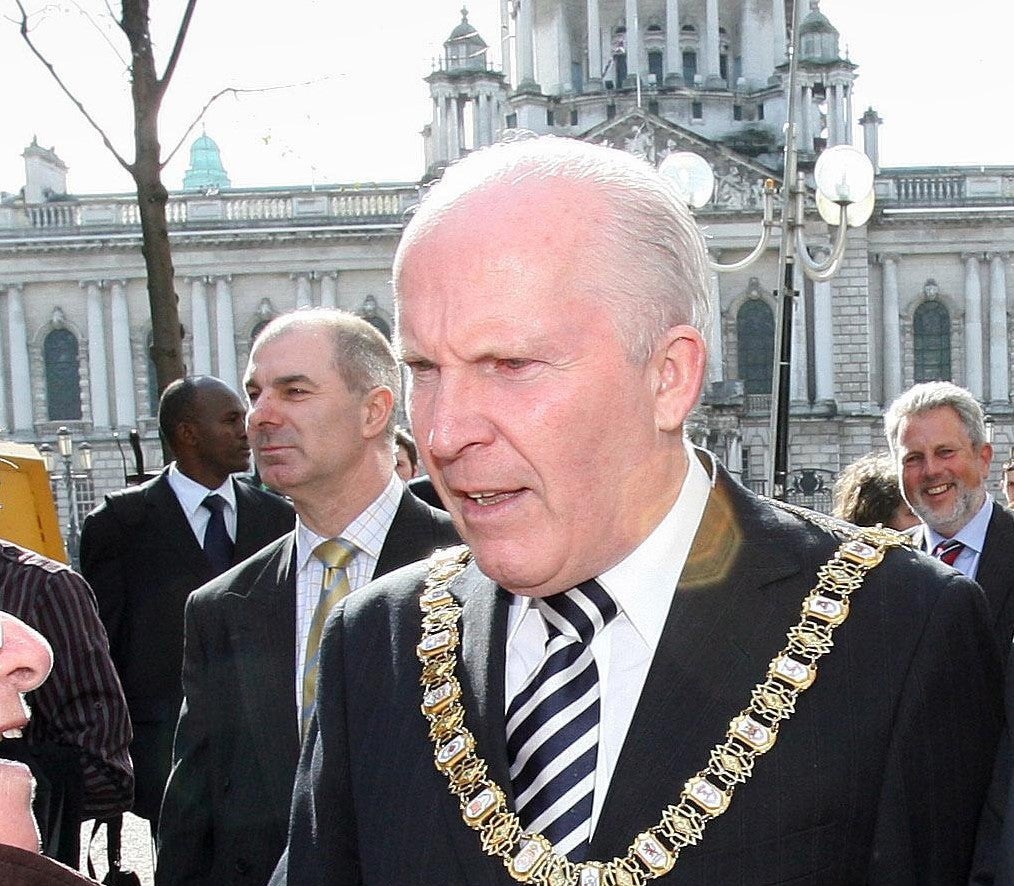UUP councillor criticised appointment of Protestant churchman to parades review
Jim Rodgers wrote to then Secretary of State Sir Patrick Mayhew in 1996 to complain about John Dunlop’s involvement in the review of parading.

An Ulster Unionist politician complained to the Government about the appointment of a former Protestant church leader to a parading review panel, archives have shown.
Belfast city councillor Jim Rodgers wrote to then Secretary of State Sir Patrick Mayhew in 1996 to express concern that former Presbyterian moderator John Dunlop had been appointed to the independent body tasked with reviewing the legal arrangements for adjudicating on contentious parades in Northern Ireland.
Mr Rodgers referenced Dr Dunlop’s “liberal and ecumenical views”, and his support for ending the playing of the national anthem at Queen’s University in Belfast in a letter that claimed the church man was “not the type of person who should have been chosen”.
Mr Dunlop's views on the loyalist orders are well known and therefore he is not the type of person who should have been chosen
Reverend Dunlop and Catholic cleric Father Oliver Crilly had been appointed to work with review chair Dr Peter North, the legal scholar and then vice chancellor of Oxford University The Government commissioned the review after a summer of violence at several parading flashpoints.
In its 1997 report, the review team recommended the creation of Northern Ireland’s Parades Commission.
In August 1996, a week after Fr Crilly and Dr Dunlop’s appointments had been announced, Mr Rodgers wrote to Sir Patrick to state his opposition.
“I am deeply concerned at the appointment to this body of the former moderator of the Presbyterian Church in Northern Ireland and the Irish Republic the Very Reverend John Dunlop,” he wrote.
“Mr Dunlop’s views on the loyalist orders are well known and therefore he is not the type of person who should have been chosen.
“He also supported the national anthem – God save the Queen – no longer being played at The Queen’s University of Belfast.
“Many people in the community believe that Mr Dunlop was deliberately selected by you because of his liberal and ecumenical views.
“Regardless what this body comes up with, the people of Northern Ireland will decide where and when marches take place.”
The letter, released by the Public Records Office of Northern Ireland, prompted an NIO reply to Mr Rodgers defending the Secretary of State’s appointments.
“These church leaders have the respect and trust of their respective communities and, as Dr Dunlop has made clear, an understanding of the depth of feeling in those communities,” it stated.
“No member of the review team, including Dr Dunlop, will approach their task encumbered by pre-conceived ideas. All were chosen because of their personal qualities and proven track record.”
Newly-released archive files from 1996 also reveal that Dr Dunlop needed to be convinced about the wisdom of appointing an English civil servant to lead the review’s support secretariat.
The files contain a letter Dr Dunlop wrote to Sir Patrick stating that he and Fr Crilly believed the secretariat should be “composed of people from Northern Ireland, who know this place and its people inside out and who have an intuitive feel for the issue”.
Internal NIO correspondence discussing Dr Dunlop’s letter highlighted that Robin Masefield, from England, had already been appointed to lead the secretariat – a move that had been cleared by Dr North.
In a letter to Sir Patrick’s private secretary, an official outlined how he had managed to convince the clerics that Mr Masefield was a suitable appointment.
“Father Crilly was easily convinced but Dr Dunlop held pretty tenaciously to the view that an Englishman was unlikely to be suitable,” he wrote.
“In the end he gave way (after having met Mr Masefield and on an understanding from me that the composition of the secretariat could be revisited at any time if the review team wished it). He therefore formally withdrew his letter to the Secretary of State.”
The archives also contain an NIO briefing note provided to Dr North when he was first appointed.
The briefing included a reference to the “belligerent” marching bands that accompany parades on both sides of the community divide.
“These are commonly known as “blood and thunder” (or on the loyalist side “kick the pope”) bands,” stated the document.
“There are also accordion, pipe and flute bands which are generally regarded as better behaved; some achieve quite high musical standards.”
Bookmark popover
Removed from bookmarks